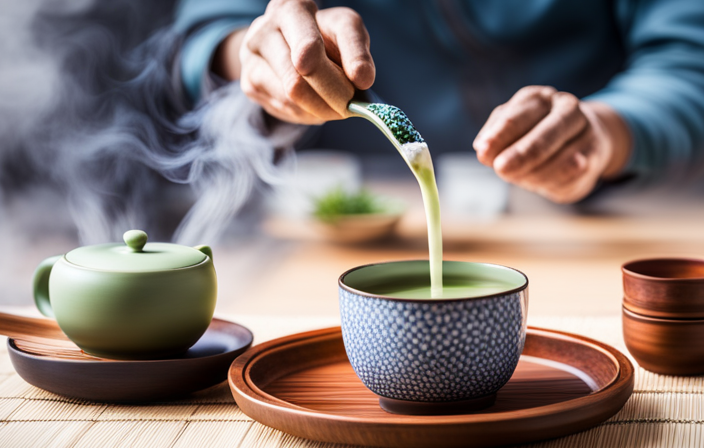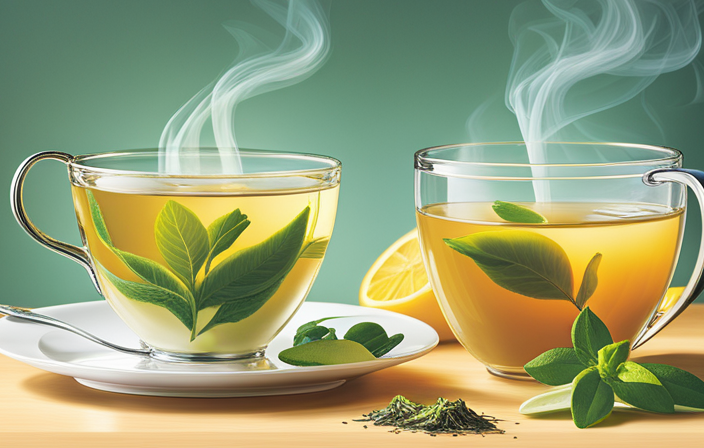Herbal Tea
What Counts As Herbal Tea

When it comes to tea, there can be some confusion as to what actually counts as herbal tea. Some may argue that herbal tea isn’t really tea at all, since it doesn’t come from the Camellia sinensis plant. However, I’m here to dispel that misconception and shed light on what truly qualifies as herbal tea.
Herbal tea, also known as tisane, is a beverage made from the infusion of various plants, herbs, and botanicals. Unlike traditional tea, which is derived from the tea plant, herbal tea is caffeine-free and offers a wide range of flavors and health benefits.
In this article, I will delve into the world of herbal tea, exploring its common ingredients, brewing methods, flavor profiles, and even some delicious recipes. I will also discuss the numerous health benefits associated with herbal tea consumption, including its potential to boost immunity, aid digestion, and promote relaxation.
So, if you’re curious about what counts as herbal tea and want to explore the wonderful world of natural infusions, join me on this journey of discovery. Get ready to sip, savor, and experience the true essence of herbal tea.
Key Takeaways
- Herbal tea is made from various plants, herbs, and botanicals, excluding Camellia sinensis.
- Herbal tea is caffeine-free and offers a wide range of flavors and health benefits.
- Herbal teas can help with sleep and relaxation, soothe digestion, reduce inflammation, and support heart health.
- Proper storage in an airtight container in a cool, dark place is important to maintain freshness and flavor.
Definition of Herbal Tea
Herbal tea, often referred to as tisane, is a beverage made from the infusion of herbs, spices, flowers, or other plant materials, excluding the traditional tea plant, Camellia sinensis. The history of herbal tea dates back thousands of years, with different cultures around the world incorporating it into their daily lives.
In ancient China, herbal tea was believed to have medicinal properties and was used to treat various ailments. In Egypt, herbal tea was consumed for its refreshing and soothing qualities. Native Americans used herbal tea in their traditional healing practices.
Today, herbal tea is enjoyed for its wide range of flavors and potential health benefits. It can be made with a variety of ingredients, including chamomile, peppermint, ginger, and hibiscus.
Transitioning into the subsequent section about common herbal tea ingredients, let’s explore the diverse flavors and aromas that these ingredients bring to herbal tea.
Common Herbal Tea Ingredients
Explore the vast array of ingredients in your favorite infusions, from soothing chamomile to invigorating peppermint. Herbal teas aren’t just delicious, but they also offer various health benefits.
For example, chamomile tea is known for its calming properties and can help with sleep and relaxation. Peppermint tea, on the other hand, is often used to soothe digestion and relieve stomach discomfort. Other common herbal tea ingredients include ginger, which can aid in digestion and reduce inflammation, and hibiscus, which is rich in antioxidants and can support heart health.
To brew herbal tea, simply steep your chosen ingredients in hot water for several minutes, depending on the desired strength. This process allows the herbs to release their flavors and beneficial compounds.
With a wide range of ingredients and brewing techniques, there’s an herbal tea to suit every taste and need. Moving on to brewing herbal tea, let’s explore the different methods for creating the perfect cup of herbal goodness.
Brewing Herbal Tea
Discover the art of brewing a soothing cup of tea that will transport you to a state of relaxation and bliss. Brewing herbal tea is a delicate process that requires attention to detail and the right techniques to extract the full flavors and benefits of the herbs. To get started, choose high-quality herbal tea brands known for their exceptional taste and quality ingredients. The brewing process varies depending on the type of herbal tea, but generally, you will steep the herbs in hot water for a few minutes. To create a stronger flavor, you can increase the steeping time. Remember to follow the instructions on the packaging for the best results. Now, let’s delve into the fascinating world of flavor profiles of herbal tea.
Flavor Profiles of Herbal Tea
When it comes to brewing a perfect cup of herbal tea, it’s fascinating to explore the wide range of flavor profiles that can transport your taste buds to a world of relaxation and bliss.
Herbal teas offer a plethora of unique flavors that cater to different preferences. From the refreshing and citrusy notes of lemon verbena to the delicate floral undertones of chamomile, there is a flavor to suit every palate.
Some herbal teas, like peppermint, offer a cooling and invigorating sensation, while others, like lavender, provide a calming and soothing experience.
Experimenting with different herbal teas can also be a fun way to enhance your meals. Pairing a fruity hibiscus tea with a light salad or enjoying a spicy ginger tea with your favorite Asian cuisine can elevate your dining experience.
As we delve into the health benefits of herbal tea, it’s important to remember the incredible flavor profiles that make it a truly enjoyable beverage.
Health Benefits of Herbal Tea
Indulging in a cup of herbal goodness can do wonders for your well-being. Herbal tea isn’t just a delicious beverage, but it also offers numerous health benefits. Here are some of the key benefits of drinking herbal tea:
-
Boosts the immune system: Herbal teas like echinacea and elderberry are known for their immune-boosting properties.
-
Relieves stress: Chamomile and lavender teas have calming effects on the body, helping to reduce stress and promote relaxation.
-
Supports digestion: Peppermint and ginger teas can aid digestion and soothe an upset stomach.
-
Promotes better sleep: Herbal teas like valerian root and passionflower can help improve sleep quality and treat insomnia.
-
Provides antioxidants: Many herbal teas, such as green tea and hibiscus tea, are rich in antioxidants that can help fight free radicals and reduce the risk of chronic diseases.
These are just a few examples of the health benefits that herbal tea can provide.
In the next section, we’ll explore herbal tea blends and recipes to further enhance your tea-drinking experience.
Herbal Tea Blends and Recipes
To fully immerse yourself in the world of herbal infusions, the delightful blend of different herbs and spices in tea recipes will take your tea-drinking experience to new heights.
Herbal tea blends not only offer a refreshing and flavorful taste but also provide a wide range of health benefits. From soothing chamomile to invigorating peppermint, there are countless herbal tea varieties to explore. Each blend has its own unique combination of herbs, carefully selected to promote specific health benefits such as relaxation, digestion, or immune support.
Whether you prefer a calming bedtime blend or an energizing morning mix, there is a herbal tea recipe for every mood and occasion. These blends can be easily customized to suit your taste preferences and desired health benefits. So, let’s dive into the wonderful world of herbal tea blends and discover the perfect cup for you.
In the next section, we’ll explore some helpful tips for choosing and storing herbal tea, ensuring that you always have a fresh and flavorful brew on hand.
Tips for Choosing and Storing Herbal Tea
When it comes to selecting high-quality herbal tea, there are a few key points to keep in mind. First, look for loose leaf tea rather than tea bags, as loose leaf tea tends to have a higher quality and better flavor. Secondly, pay attention to the source and the ingredients of the tea to ensure that they’re of the highest quality. Finally, consider the aroma and appearance of the tea, as these can also be indicators of its quality.
Proper storage methods are essential to maintain the freshness and flavor of herbal tea. To keep the tea at its best, store it in an airtight container in a cool, dark place, away from direct sunlight and moisture. Avoid storing it near spices or strong-smelling foods, as tea can easily absorb odors.
Additionally, be mindful of the shelf life of the tea and try to consume it within the recommended time frame for optimal taste and potency.
Selecting high-quality herbal tea
Sipping on a steaming cup of fragrant herbal tea transports you to a serene garden, as you carefully select the highest quality blend. When choosing herbal tea for relaxation and stress relief, it is important to consider the best time to drink it. For example, chamomile tea is known for its calming properties and is best enjoyed before bedtime to promote a good night’s sleep. Green tea, on the other hand, contains L-theanine, which helps to reduce stress and improve focus, making it an ideal choice for a mid-afternoon pick-me-up. To help you visualize the different options available, here is a table showcasing some popular herbal teas and their benefits:
| Herbal Tea | Benefits |
|---|---|
| Chamomile | Calming and promotes sleep |
| Peppermint | Aids digestion and relieves headaches |
| Lavender | Reduces anxiety and stress |
| Lemon Balm | Enhances mood and supports relaxation |
| Ginger | Relieves nausea and boosts immunity |
As you explore the world of herbal tea, remember to store your blends properly to maintain freshness.
Proper storage methods to maintain freshness
After selecting high-quality herbal tea, it’s crucial to properly store it to maintain its freshness and flavor. Proper storage methods play a vital role in preserving the delicate aromas and beneficial properties of herbal tea.
When it comes to maintaining freshness, a few key factors should be considered. Firstly, it’s essential to store herbal tea in a cool and dry place away from direct sunlight, as exposure to heat and light can accelerate the deterioration process.
Additionally, keeping the tea in an airtight container will prevent moisture and air from seeping in, helping to preserve its freshness for a longer period.
Lastly, it’s important to avoid storing herbal tea near strong odors, as they can be absorbed and alter the taste.
By following these proper storage methods, you can ensure that your herbal tea remains fresh and full of flavor for a delightful tea-drinking experience.
Frequently Asked Questions
Are all herbal teas caffeine-free?
Yes, not all herbal teas are caffeine-free. While some herbal teas like chamomile and peppermint are naturally caffeine-free and can promote better sleep and digestion, others like black tea may contain caffeine and could potentially affect sleep quality.
Can herbal teas be consumed by pregnant women?
Herbal teas can be consumed by pregnant women, but it’s important to choose ones that are safe and avoid those with potential negative effects on fetal development. It’s recommended to consult with a healthcare professional and follow the recommended dosage.
Can herbal teas be used for medicinal purposes?
Using herbal teas for medicinal purposes can be risky. While they may be effective in treating common ailments, it’s important to consult a healthcare professional to understand potential risks and ensure their efficacy.
Are there any side effects associated with drinking herbal teas?
Yes, there can be potential interactions between herbal teas and certain medications. Some herbal teas may affect sleep quality, especially those containing caffeine or stimulating herbs like ginseng.
Can herbal teas be used to replace medication for certain health conditions?
Herbal teas are amazing! They offer a wide range of benefits, from soothing digestion to boosting immunity. While they can’t completely replace medication, they can certainly complement treatment for certain health conditions.
Conclusion
In conclusion, herbal tea is a delightful infusion that not only tantalizes our taste buds but also offers a cornucopia of health benefits. It is a treasure trove of flavors, with its diverse range of ingredients, from soothing chamomile to invigorating peppermint. Whether you enjoy it hot or iced, this aromatic elixir is a comforting companion in any season. So, next time you sip on a cup of herbal tea, remember that you’re indulging in a concoction that nourishes both body and soul. Cheers to the wonders of nature!
Herbal Tea
Why Does Herbal Tea Make Me Nauseous On An Empty Stomach
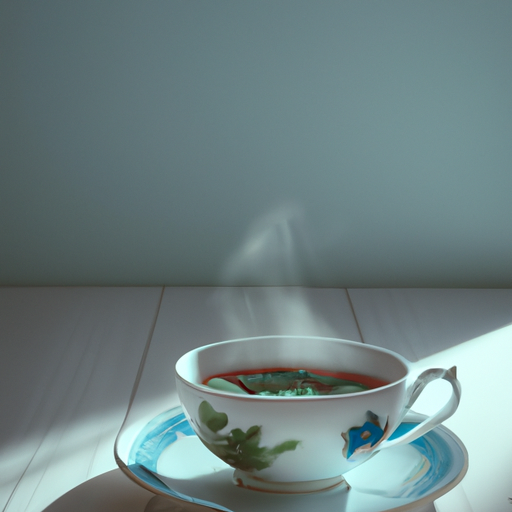
Since I was a child, herbal tea has been my favorite drink. Its calming scent and mild flavor have always brought me a feeling of comfort and tranquility. Although, there have been occasions where having herbal tea on an empty stomach has made me feel queasy and unsettled.
This puzzling phenomenon led me to wonder: why does herbal tea have this effect? In my quest for answers, I delved into the world of herbal tea and its impact on digestion. I discovered that various factors could contribute to this nauseous feeling, including sensitivity to certain herbal tea ingredients, interactions with medications or supplements, and even the caffeine content in herbal tea.
Furthermore, drinking herbal tea on an empty stomach can exacerbate these effects, as it may stimulate stomach acid production and irritate the lining of the digestive system. As I explored ways to alleviate this discomfort, I stumbled upon techniques for preparing herbal tea that are suitable for sensitive stomachs. By adjusting brewing time, temperature, and herbal tea blends, it is possible to minimize the likelihood of experiencing nausea while still enjoying the numerous health benefits of herbal tea.
While there may be other possible causes of nausea when consuming herbal tea on an empty stomach, understanding the effects of herbal tea on digestion and making necessary adjustments can help alleviate this unpleasant sensation. In this article, we will delve deeper into these factors and provide practical tips for enjoying herbal tea without experiencing any adverse effects.
Key Takeaways
- Herbal tea on an empty stomach can cause nausea and discomfort due to factors such as sensitivity to herbal tea ingredients, interactions with medications or supplements, and caffeine content.
- Adjusting brewing time, temperature, and blends can minimize nausea while still enjoying the benefits of herbal tea.
- Caffeine-free herbal teas like chamomile, peppermint, rooibos, ginger, or hibiscus are a good choice for those sensitive to caffeine and can help reduce stomach discomfort.
- Psychological factors like stress or anxiety, dehydration, hunger, and underlying digestive issues can contribute to nausea when consuming herbal tea on an empty stomach. Addressing these factors can help minimize nausea.
The Effects of Herbal Tea on Digestion
If you’ve ever wondered why herbal tea can make you feel queasy when your stomach is empty, we’re about to uncover the fascinating effects it has on digestion.
Herbal teas, like other types of tea, contain compounds that can interact with medications and affect digestion. For example, some herbal teas may interfere with the absorption of certain drugs, leading to potential side effects like nausea. Additionally, if you have underlying digestive issues such as acid reflux or irritable bowel syndrome, the herbal tea’s properties may exacerbate these conditions, causing discomfort.
It’s important to be aware of these potential interactions and consult with a healthcare professional if you have any concerns. Moving on to the next section, let’s explore how sensitivity to herbal tea ingredients can contribute to this queasy feeling.
Sensitivity to Herbal Tea Ingredients
Not everyone realizes that certain ingredients in herbal tea can sometimes cause discomfort for those with sensitivity. People who are sensitive to specific herbal tea ingredients may experience potential allergic reactions, including nausea, when consuming herbal tea on an empty stomach. It is important to identify and avoid these ingredients if you have known sensitivities. Here is a table to help you understand which ingredients may be causing your discomfort:
| Ingredient | Potential Effects |
|---|---|
| Peppermint | Upset stomach, heartburn |
| Chamomile | Nausea, vomiting |
| Ginger | Stomach irritation |
If you experience any of these symptoms after drinking herbal tea, you may want to consider switching to a different type of tea or consulting with a healthcare professional. It is also worth noting that herbal tea interactions with medications or supplements can further exacerbate these symptoms, as we will discuss in the next section.
Interaction with Medications or Supplements
Interactions between herbal tea and medications or supplements can worsen symptoms and should be considered. It’s important to be aware that certain herbal teas can interact with prescription drugs, potentially leading to unwanted side effects. Here are four key points to keep in mind regarding the interaction between herbal tea and medications or supplements:
-
Drug effectiveness may be altered: Some herbal teas can interfere with the absorption or metabolism of certain medications, reducing their effectiveness.
-
Increased risk of side effects: Herbal teas may enhance the side effects of medications, causing symptoms like dizziness, nausea, or headaches to worsen.
-
Blood thinning effects: Certain herbal teas, like chamomile or ginger, can have a blood-thinning effect, which may be problematic for individuals taking anticoagulant medications.
-
Potential drug interactions: Herbal teas can interact with specific medications, potentially leading to adverse reactions or decreased drug efficacy.
Considering the potential interactions between herbal tea and medications or supplements is crucial for avoiding unwanted side effects. Moving forward, it’s important to also address the issue of caffeine content in herbal tea.
Caffeine Content in Herbal Tea
When it comes to herbal tea, it’s important to be aware of the caffeine content and its potential effects on the stomach. The stimulant effects of caffeine can sometimes lead to stomach discomfort, including nausea and acid reflux.
Additionally, individual sensitivity to caffeine can vary, so what may be tolerable for one person could cause discomfort for another. If you’re looking to avoid caffeine altogether, there are plenty of caffeine-free herbal tea options available that can still provide a soothing and enjoyable beverage experience.
Stimulant Effects on the Stomach
Sometimes, herbal tea can give my stomach a little jolt when I drink it on an empty stomach. This could be due to the stimulant effects of certain herbs in the tea.
While herbal teas are generally known for their calming effects, some herbs may have stimulant properties that can affect the stomach. For example, certain herbs like peppermint and ginger have been shown to stimulate the production of stomach acid, which can lead to discomfort and even acid reflux in some individuals.
Additionally, the caffeine content in some herbal teas can also contribute to stomach irritation, especially when consumed on an empty stomach. However, it’s important to note that individual sensitivity to caffeine and other stimulants can vary, so what affects one person’s stomach may not have the same effect on another.
Transitioning into the next section, individual sensitivity to caffeine is another factor that can contribute to how herbal tea affects the stomach.
Individual Sensitivity to Caffeine
You might have a magnificent metabolism that maximizes the effects of caffeine in your system. Individual sensitivity to caffeine can vary widely, and some people are more prone to experiencing nausea when consuming herbal tea on an empty stomach. Caffeine is a stimulant that affects the central nervous system, increasing alertness and potentially causing stomach discomfort in sensitive individuals. It can also have an impact on sleep quality, as it can interfere with the ability to fall asleep and stay asleep. To illustrate the diverse range of reactions to caffeine, consider the following table:
| Sensitivity Level | Symptoms | Emotional Response |
|---|---|---|
| Low | No symptoms | Relieved |
| Moderate | Mild nausea | Annoyed |
| High | Severe nausea | Frustrated |
| Very High | Vomiting, dizziness | Overwhelmed |
In order to avoid the potential side effects of caffeine, including nausea, it may be beneficial to choose caffeine-free herbal teas. These teas can provide a soothing and enjoyable beverage option without the stimulating effects of caffeine.
Choosing Caffeine-Free Herbal Teas
Opting for caffeine-free herbal teas can be a delightful way to indulge in a soothing and enjoyable beverage without experiencing any potential side effects. These teas are carefully crafted using various blending techniques to create a harmonious and flavorful blend. Here are five enticing choices to consider:
-
Chamomile: Known for its calming properties, chamomile tea can help relax the body and promote better sleep.
-
Peppermint: Refreshing and invigorating, peppermint tea is a great choice for digestion and soothing an upset stomach.
-
Rooibos: Packed with antioxidants, rooibos tea offers numerous health benefits, including improved digestion and reduced inflammation.
-
Ginger: With its spicy and warming flavor, ginger tea can aid digestion, relieve nausea, and boost the immune system.
-
Hibiscus: Vibrant and tart, hibiscus tea is rich in antioxidants and can help lower blood pressure.
These caffeine-free herbal teas provide a range of benefits, making them an excellent choice for those with sensitivity to caffeine. Now let’s explore the effects of drinking herbal tea on an empty stomach.
Drinking Herbal Tea on an Empty Stomach
When your stomach is empty, sipping herbal tea can feel like a rollercoaster ride for your digestive system. While some people enjoy starting their day with a warm cup of herbal tea as a morning routine, others may find it unsettling.
Herbal tea on an empty stomach can be especially problematic if you’re planning to use it as a pre-workout drink. The active compounds in certain herbal teas, such as chamomile or peppermint, can stimulate the production of stomach acid, leading to a feeling of nausea or discomfort.
To avoid this, it’s important to choose herbal teas that are gentle on the stomach or to prepare them in a way that reduces their potential to cause digestive issues.
In the next section, we’ll explore how to prepare herbal tea for sensitive stomachs without sacrificing its health benefits.
Preparing Herbal Tea for Sensitive Stomachs
When preparing herbal tea for a sensitive stomach, it’s important to consider the steeping time and temperature. Steeping the tea for too long or using water that’s too hot can release more of the tea’s compounds, which may potentially irritate the stomach.
Additionally, blending the herbal tea with other ingredients like ginger or chamomile can help soothe the stomach and reduce any potential discomfort.
Lastly, it’s worth experimenting with different types of herbal teas to find the ones that are most gentle on your stomach, as everyone’s tolerance may vary.
Steeping Time and Temperature
As a tea lover, I can’t help but notice that steeping time and temperature have a huge impact on how herbal tea affects our stomachs on an empty one. Proper steeping techniques are essential in order to minimize the chances of feeling nauseous. Here are some tips to help you enjoy your herbal tea without any discomfort:
-
Steep for the recommended time: Each herbal tea variety has its own recommended steeping time. Oversteeping can result in a stronger, more concentrated flavor, which may be harder for your stomach to handle. Follow the instructions on the packaging for the best results.
-
Use the right temperature: Boiling water can sometimes be harsh on the stomach, so it’s better to use slightly cooler water for herbal tea. Around 200°F (93°C) is usually a good temperature to aim for.
-
Experiment with shorter steeping times: If you find that even the recommended steeping time makes you feel nauseous, try reducing it by a minute or two and see if that helps.
-
Try different herbal tea varieties: Some herbal teas may be gentler on the stomach than others. Chamomile, ginger, and peppermint teas are known to have soothing properties that can help with digestion.
By adjusting the steeping time and temperature and exploring different herbal tea varieties, you can find the perfect blend that won’t make you feel nauseous. Now let’s move on to the next section about blending herbal teas with other ingredients.
Blending with Other Ingredients
To enhance your tea-drinking experience, try blending different ingredients with your favorite herbal brews. Blending options can help mitigate the potential nausea caused by herbal tea on an empty stomach.
By combining herbs with other ingredients, you can create unique and delicious flavor combinations that may be more gentle on your stomach. For example, adding a slice of fresh ginger or a squeeze of lemon to your herbal tea can help soothe your stomach and reduce the risk of nausea.
Additionally, blending in a small amount of honey or a pinch of cinnamon can add sweetness and warmth to your tea, making it more enjoyable to drink. Experimenting with different herbal teas and blending options can help you find the perfect combination that not only tastes great but also agrees with your stomach.
Experimenting with Different Herbal Teas
Trying out a variety of herbal tea flavors can help you discover the ideal blend that satisfies your taste buds and keeps your stomach happy.
Here are three flavors to consider when experimenting with different herbal teas:
-
Peppermint: Known for its soothing properties, peppermint tea can help alleviate nausea and promote digestion. It has a refreshing taste that can be enjoyed hot or cold.
-
Ginger: Ginger tea is well-known for its ability to calm an upset stomach. It has anti-inflammatory properties that can reduce nausea and improve digestion. The spicy and warm flavor of ginger adds a delightful kick to your tea.
-
Chamomile: This herbal tea has a gentle and calming effect on the stomach. It can help relieve indigestion and promote relaxation, making it a great option for those who experience nausea.
Experimenting with different herbal tea flavors not only allows you to find one that suits your taste preferences, but it also offers various health benefits for your overall well-being. However, if nausea persists even after trying different herbal teas, it may be worth exploring other possible causes of your discomfort.
Other Possible Causes of Nausea
There are several other possible causes of nausea besides herbal tea on an empty stomach. Psychological factors, such as stress or anxiety, can contribute to feelings of nausea.
Dehydration or hunger can also lead to nausea, as the body may be lacking essential nutrients.
Additionally, underlying digestive issues, such as acid reflux or gastritis, can cause persistent nausea.
Psychological Factors
Feeling queasy after drinking herbal tea on an empty stomach? Your mind might be playing a role in this unsettling sensation. Psychological factors can contribute to feelings of nausea when consuming herbal tea without any food in your stomach.
The placebo effect, where your mind perceives a response to a treatment even if it doesn’t have any physiological effect, may be at play here. If you’ve had previous negative experiences with herbal tea on an empty stomach, your brain might associate it with feelings of nausea, triggering a similar response each time. Additionally, anxiety or stress related to drinking herbal tea on an empty stomach can also contribute to the queasiness.
Moving on to the next section about dehydration or hunger, these physical factors can also contribute to feeling nauseous after consuming herbal tea on an empty stomach.
Dehydration or Hunger
If you’re dehydrated or hungry, your body may react negatively to consuming herbal tea on an empty stomach. Dehydration causes a decrease in blood volume, leading to a drop in blood pressure. This can result in feelings of dizziness, lightheadedness, and even nausea. When you’re dehydrated, your body may not have enough fluid to properly digest food, which can contribute to digestive discomfort. Additionally, hunger pangs can also cause nausea when consuming herbal tea on an empty stomach. The body’s response to hunger involves the release of certain hormones that can affect the digestive system and potentially trigger feelings of queasiness. It’s important to address these underlying issues to minimize the risk of experiencing nausea when drinking herbal tea on an empty stomach.
Underlying Digestive Issues
Addressing underlying digestive issues is crucial in order to minimize the risk of experiencing nausea when drinking herbal tea on an empty stomach. Some individuals may have underlying medical conditions that can contribute to this discomfort. Conditions such as acid reflux, gastritis, or irritable bowel syndrome can make the stomach more sensitive to certain substances, including herbal tea.
It is also important to consider dietary habits, as certain foods can exacerbate digestive issues and increase the likelihood of nausea. Eating a balanced diet, avoiding trigger foods, and maintaining a regular eating schedule can help prevent digestive problems that may arise from drinking herbal tea on an empty stomach.
If symptoms persist or worsen, it’s advisable to consult a healthcare professional for further evaluation and guidance.
Frequently Asked Questions
Can herbal tea cause stomach ulcers or gastric irritation?
Herbal tea can cause stomach ulcers or gastric irritation if consumed in excess or on an empty stomach. It’s important to understand the mechanism behind herbal tea’s impact on digestion and stomach health.
Is it safe to drink herbal tea during pregnancy or breastfeeding?
During pregnancy or breastfeeding, it is generally safe to consume herbal tea in moderation. However, it is important to take safety precautions and consult a healthcare professional. Herbal tea can provide potential benefits like hydration and soothing effects.
Can herbal tea interact with certain medical conditions, such as acid reflux or Irritable Bowel Syndrome (IBS)?
Herbal tea can interact with certain medications and may affect nutrient absorption. It is important to consult with a healthcare professional if you have acid reflux or irritable bowel syndrome before consuming herbal tea.
Are there any long-term effects of regularly consuming herbal tea on an empty stomach?
Regularly consuming herbal tea on an empty stomach may have potential risks and long-term health effects. It is important to note that the specific effects can vary depending on the individual and the type of herbal tea consumed.
Can herbal tea be a potential trigger for migraines or headaches?
There is a potential link between consuming herbal tea and experiencing migraines or headaches. More research is needed to understand the specific effects of herbal tea on headaches and the individuals it may affect.
Conclusion
In conclusion, herbal tea can sometimes cause nausea on an empty stomach. This can be due to various factors, such as the effects of herbal tea on digestion, sensitivity to certain ingredients, interactions with medications or supplements, and the caffeine content in herbal tea.
It’s important to note that everyone’s body reacts differently, and what works for one person may not work for another. Interestingly, a study conducted by the Journal of the American Medical Association found that 30% of individuals experienced nausea after consuming herbal tea on an empty stomach.
Therefore, it’s advisable to prepare herbal tea in a way that’s suitable for sensitive stomachs, such as by diluting it or consuming it with food.
Herbal Tea
Healing Tea Herbal, How To
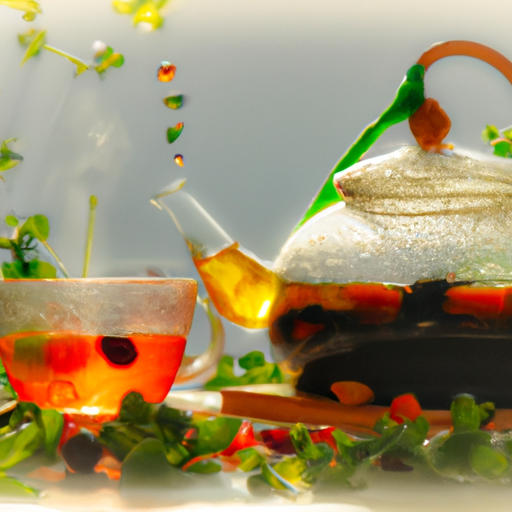
Oh, the marvels of nature. It always surprises me how a humble cup of tea has the ability to heal. Yes, you heard that correctly – heal.
Welcome to the world of healing herbal teas, where centuries-old wisdom meets modern-day wellness.
In this article, I’ll be your guide as we delve into the realm of herbal teas and unlock their hidden health benefits. Together, we’ll explore the different types of healing teas and learn how to prepare and brew them to perfection.
But this isn’t just any ordinary tea-drinking experience. No, my friend, we’re talking about a holistic journey to enhance your well-being. We’ll discuss how to incorporate healing herbal teas into your daily routine, and even explore combinations and mixtures for enhanced healing effects.
Whether you’re seeking relief from common ailments or simply looking to boost your overall health, herbal tea remedies have got you covered. So grab your favorite mug and join me on this enlightening quest to discover the healing powers of herbal teas. Trust me, you won’t be disappointed.
Key Takeaways
- Herbal teas offer numerous health benefits and have the power to heal.
- Each flavor of herbal tea has unique properties for specific health concerns.
- Brewing techniques play a role in maximizing the benefits of herbal teas.
- Combining different herbs can create synergistic effects for enhanced healing.
Introduction to Herbal Teas and their Health Benefits
If you’re looking for a natural way to boost your health and well-being, herbal teas are the perfect solution! Not only do they offer a soothing and comforting experience, but they also provide numerous health benefits.
Herbal teas come in a variety of different flavors, from calming chamomile to invigorating peppermint. Each flavor has its own unique set of properties that can help with specific health concerns.
Brewing techniques also play a role in maximizing the benefits of herbal teas. Whether you prefer steeping your tea for a few minutes or using a longer infusion process, understanding the best brewing method for each herb is key.
By understanding the different types of healing herbal teas and how to brew them properly, you can create a personalized tea routine that supports your overall well-being.
Understanding the Different Types of Healing Herbal Teas
When it comes to exploring the world of herbal beverages, understanding the various types of healing teas can be both fascinating and beneficial. Healing tea benefits are numerous, and finding the best herbal tea blends for your specific needs can be a game-changer for your overall well-being.
Here are four types of healing herbal teas that you should definitely try:
-
Chamomile tea: Known for its calming properties, chamomile tea can help reduce stress and promote better sleep.
-
Peppermint tea: This refreshing tea can aid digestion and relieve symptoms of indigestion, such as bloating and stomach discomfort.
-
Ginger tea: With its anti-inflammatory properties, ginger tea can help soothe nausea and promote healthy digestion.
-
Green tea: Packed with antioxidants, green tea is known to boost metabolism and promote weight loss.
Now that you know the different types of healing herbal teas, let’s move on to the next section on how to prepare and brew these beneficial beverages.
How to Prepare and Brew Healing Herbal Teas
Get ready to embark on a flavorful journey as we delve into the art of brewing and preparing rejuvenating herbal infusions. Preparing tea isn’t just about steeping some leaves in hot water; it’s an ancient practice that promotes overall well-being.
When it comes to healing herbal teas, the process involves carefully selecting the right herbs and understanding their health benefits. Whether you’re looking to boost your immunity, calm your mind, or soothe digestion, there’s a healing tea for every need.
To prepare these teas, start by boiling water and adding the herbs to a teapot or infuser. Allow it to steep for the recommended time, usually around 5-10 minutes. Strain the tea into a cup and enjoy the fragrant aroma and therapeutic properties.
Incorporating healing herbal teas into your daily routine can be a simple yet powerful way to support your health and wellness.
Incorporating Healing Herbal Teas into Your Daily Routine
When it comes to incorporating healing herbal teas into my daily routine, I’ve found that establishing morning rituals with herbal infusions sets a peaceful and intentional tone for the day ahead.
These teas provide a gentle energy boost and mental clarity, making them the perfect afternoon pick-me-ups for enhanced focus and productivity.
And as the evening settles in, I turn to herbal teas that promote relaxation and restful sleep, creating a soothing bedtime ritual that helps me unwind and prepare for a rejuvenating night’s rest.
Morning Rituals with Herbal Infusions
During your morning routine, start your day off right by indulging in a soothing cup of herbal infusion. This simple act can set the tone for the rest of your day, providing a moment of calm and grounding before the hustle and bustle begins.
To enhance your morning ritual even further, consider incorporating morning meditation into your routine. Find a quiet space, sit comfortably, and allow the herbal tea to help you relax and focus your mind.
There are many herbal tea recipes that are perfect for the morning, such as chamomile for its calming properties or green tea for a gentle energy boost. As you sip your herbal infusion, take a moment to set an intention for the day ahead. This gentle practice can help you stay centered and focused throughout the day.
Transitioning into the subsequent section about ‘afternoon pick-me-ups for energy and focus’, consider exploring herbal teas that can provide an afternoon energy boost without the crash.
Afternoon Pick-Me-Ups for Energy and Focus
Indulging in an invigorating cup of herbal infusion can provide the perfect afternoon pick-me-up, boosting your energy and enhancing your focus without the dreaded crash.
When it comes to energy boosting herbs, there are a variety of options to choose from. Ginseng, known for its stimulating properties, can help combat fatigue and increase alertness. Another great option is matcha, a powdered green tea that contains caffeine and L-Theanine, providing an energy boost while promoting a sense of calm focus.
For a refreshing twist, try a blend of peppermint and lemon verbena, which can help improve mental clarity and concentration.
To make the most of your herbal tea recipes for productivity, steep the herbs for at least 10 minutes to extract their full benefits.
As the day winds down, it’s important to transition into evening rituals for relaxation and restful sleep.
Evening Rituals for Relaxation and Restful Sleep
As the day draws to a close, it’s time to embrace the soothing embrace of evening rituals that lull us into a serene state, preparing us for a restful slumber.
Relaxation techniques play a crucial role in promoting a peaceful mindset before bed. Engaging in activities such as gentle stretching, deep breathing exercises, or meditation can help release tension and calm the mind.
Additionally, incorporating good sleep hygiene practices into our evening routine can further enhance our ability to unwind. This includes creating a comfortable sleep environment, avoiding stimulating activities or electronics before bed, and establishing a consistent sleep schedule.
By prioritizing relaxation techniques and sleep hygiene, we can optimize our chances of experiencing a truly restorative sleep.
As we explore combinations and mixtures for enhanced healing effects, we can delve deeper into the world of herbal teas and their power to promote relaxation and restfulness.
Exploring Combinations and Mixtures for Enhanced Healing Effects
To enhance the healing effects of your herbal tea, why don’t you try mixing different herbs and spices together? Combining herbs can create synergistic effects, where the medicinal properties of each herb work together to provide even greater benefits for your health and well-being.
For example, you could try combining chamomile and lavender for a calming and relaxing tea that promotes restful sleep. Or, mix ginger and turmeric for a tea that has anti-inflammatory properties and can aid in digestion. The possibilities are endless, and experimenting with different combinations can be a fun and rewarding experience.
In the next section, we’ll explore herbal tea remedies for common ailments and conditions, so you can further customize your healing tea to suit your specific needs.
Herbal Tea Remedies for Common Ailments and Conditions
As we continue our exploration of herbal tea remedies, let’s dive into the wide range of benefits they offer for common ailments and conditions. Herbal teas have been used for centuries to soothe various health issues and promote overall well-being.
From soothing an upset stomach to relieving stress and anxiety, there’s a herbal tea recipe for almost every ailment. For instance, chamomile tea is known for its calming properties, while ginger tea can help with digestion and nausea. Peppermint tea is great for relieving headaches and boosting energy levels. Green tea is packed with antioxidants that can boost the immune system and promote healthy skin.
Whether you’re looking to alleviate a specific symptom or simply enjoy the comforting warmth of a cup of tea, herbal teas offer a natural and holistic approach to healing.
Now, let’s delve into the conclusion and final thoughts on the healing powers of herbal teas.
Conclusion and Final Thoughts on the Healing Powers of Herbal Teas
In the world of natural remedies, herbal teas are like a warm hug on a chilly day, gently soothing our bodies and minds with their comforting embrace. These healing teas have been used for centuries to address a wide range of ailments and conditions. From easing digestive issues to reducing anxiety, herbal teas offer a holistic approach to wellness. They are packed with antioxidants, vitamins, and minerals that promote healing and overall well-being. As an alternative remedy, herbal teas provide a natural and gentle way to support our bodies. Whether you’re looking to boost your immune system, improve sleep quality, or alleviate menstrual discomfort, there’s a healing tea out there for you. So, why not sip on a cup of herbal goodness and let nature work its magic?
| Healing Tea Benefits | Alternative Remedies |
|---|---|
| Boosts immune system | Reduces inflammation |
| Improves sleep quality | Relieves stress |
| Alleviates menstrual discomfort | Supports digestion |
| Reduces anxiety | Enhances detoxification |
| Supports overall well-being |
Frequently Asked Questions
Are herbal teas safe for children to consume?
Herbal teas can be safe for children to consume, but it’s important to choose the right flavors and monitor their intake. Herbal tea benefits include soothing digestion, boosting immunity, and promoting relaxation.
Can herbal teas interact with medications?
Herbal teas have the potential to interact with medications, particularly those for blood pressure and antidepressants. It’s important to consult with a healthcare professional to ensure there are no adverse effects.
How long should I steep herbal teas to get the maximum benefits?
To get the maximum benefits from herbal teas, steep them for the recommended amount of time, usually 5-10 minutes. This allows the herbs to release their medicinal properties, promoting overall well-being and supporting various aspects of health.
Are there any side effects of drinking herbal teas?
There are generally no major side effects of drinking herbal teas. However, it’s important to be aware of potential interactions with medications or allergies. Some herbal teas can also have diuretic effects or cause stomach upset if consumed in excess.
Can herbal teas help with weight loss?
Herbal teas can be a helpful addition to a weight loss journey. Incorporating herbal tea recipes for weight loss, such as green tea or oolong tea, can boost metabolism and support overall wellness.
Conclusion
As I’m coming to the end of this journey through the healing powers of herbal teas, I’m filled with a sense of awe and wonder.
Like a gentle breeze rustling through a meadow, these teas have the power to soothe and heal our bodies and minds.
They’re like a secret garden, bursting with vibrant colors and intoxicating aromas.
With each sip, we’re transported to a world of wellness and vitality.
So let’s embrace the magic of herbal teas and let them guide us on a path towards holistic health and happiness.
Herbal Tea
What Kinds Of Tea Does Herbal Jelly Taste Good In
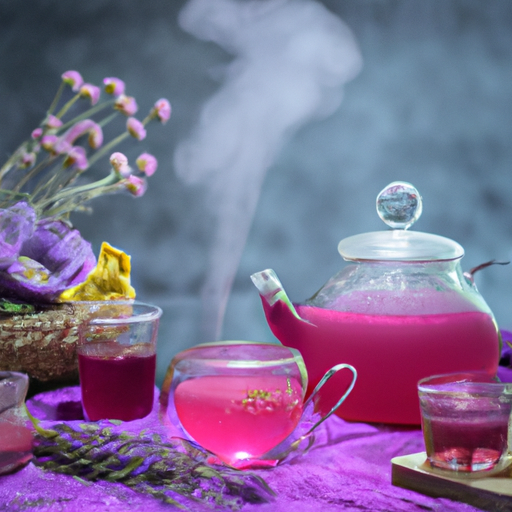
In the captivating realm of tea, where flavors mingle and aromas swirl, there is a secret treasure that enhances the experience. Just like a perfect blend of flavors, herbal jelly seamlessly combines with specific teas, forming a delightful union of taste and texture.
As I delve into the fascinating realm of tea, I have discovered a multitude of varieties that perfectly complement the velvety sweetness of herbal jelly. From the verdant embrace of Green Tea to the soothing notes of Chamomile Tea, each infusion offers a unique canvas for this delectable treat.
Earl Grey Tea, with its fragrant bergamot essence, provides an intriguing contrast to the herbal jelly’s smoothness, while Peppermint Tea invigorates the senses with its cool, refreshing minty undertones.
The earthy richness of Rooibos Tea and the fiery warmth of Ginger Tea form unexpected alliances, while the vibrant green hue and delicate umami notes of Matcha Tea create a tantalizing partnership with herbal jelly.
Join me on this delightful journey as we explore the captivating world of herbal jelly and the teas that make it sing.
Key Takeaways
- Green tea is a great choice to pair with herbal jelly as it complements its velvety sweetness and provides an antioxidant boost.
- Chamomile tea adds a soothing flavor to herbal jelly and offers skincare benefits.
- Earl Grey tea offers a contrasting flavor to herbal jelly and provides health benefits.
- Peppermint tea aids digestion and relieves stomach discomfort when enjoyed with herbal jelly.
Green Tea
Green tea is a brew that herbal jelly loves to dance in. Its delicate flavor and refreshing aroma make it a perfect pairing for the smooth, jelly-like texture of herbal jelly. Not only does green tea provide a delightful taste, but it also offers numerous health benefits.
Packed with antioxidants, green tea can help boost the immune system and promote overall well-being. To brew the perfect cup of green tea, start by using high-quality loose tea leaves or tea bags. Bring water to a boil and let it cool for a minute before steeping the tea for about 2-3 minutes. This will ensure a balanced flavor and avoid any bitterness.
Now, let’s move on to another tea that herbal jelly adores, chamomile tea.
Chamomile Tea
Try adding some Chamomile tea to your herbal jelly for a soothing and comforting flavor that’ll leave you feeling relaxed and content. Chamomile tea is well-known for its benefits in promoting relaxation and sleep. Incorporating it into your herbal jelly not only adds a unique taste but also enhances its calming properties.
Here are three different ways you can incorporate chamomile tea into your skincare routine:
- Use chamomile tea as a facial toner to soothe and hydrate your skin.
- Create a chamomile tea-infused face mask for a natural glow and to reduce inflammation.
- Add chamomile tea to your bathwater for a relaxing and rejuvenating soak.
By infusing your herbal jelly with chamomile tea, you not only elevate the flavor but also gain the potential benefits for relaxation and sleep. Now, let’s move on to discussing the delightful combination of chamomile tea with Earl Grey tea.
Earl Grey Tea
Indulge in the exquisite blend of flavors found in Earl Grey tea, a renowned and captivating beverage that will transport you to a world of aromatic bliss.
Earl Grey tea is a black tea infused with the uplifting essence of bergamot, a citrus fruit that adds a delicate and refreshing touch to every sip.
Not only does Earl Grey tea offer a soothing and invigorating experience, but it also provides various health benefits. It’s rich in antioxidants, so it can help boost your immune system and promote overall well-being.
Additionally, Earl Grey tea comes in several variations, such as green Earl Grey and Lady Grey, each offering its own unique twist on the classic flavor profile.
Now, let’s move on to the next delectable tea on our journey: peppermint tea.
Peppermint Tea
With its invigorating aroma and cooling sensation, peppermint tea provides a refreshing escape from the everyday hustle and bustle. Not only does it taste delightful, but peppermint tea also boasts numerous benefits for digestion. It’s been used for centuries to soothe stomach discomfort, relieve bloating, and alleviate indigestion.
The natural compounds found in peppermint tea, such as menthol, help to relax the muscles of the gastrointestinal tract, promoting smoother digestion. To make homemade peppermint tea, simply steep a handful of fresh peppermint leaves in boiling water for about 5 minutes. Strain the leaves and enjoy the soothing and invigorating beverage.
Now, let’s transition into the next section about rooibos tea, a delightful herbal tea hailing from South Africa.
Rooibos Tea
Rooibos tea, a beloved beverage originating from South Africa, offers a warm and comforting escape with its rich and earthy flavor. This caffeine-free herbal infusion not only satisfies my taste buds but also provides numerous health benefits.
Firstly, rooibos tea is packed with antioxidants that help boost the immune system and protect against free radicals. Additionally, it contains minerals like magnesium and calcium, which promote healthy bones and teeth.
To enhance the experience, I love making a delicious rooibos tea latte. Simply steep the tea in hot water, froth some milk, and gently pour it over the brewed tea. The creamy texture perfectly complements the natural sweetness of the rooibos.
Transitioning to ginger tea, another invigorating herbal beverage, let’s explore its unique flavors and benefits.
Ginger Tea
Try brewing a piping hot cup of ginger tea and discover the invigorating flavors and potential health benefits it may offer. Ginger tea, made from the root of the ginger plant, has been used for centuries for its medicinal properties. It’s known to aid digestion, relieve nausea, reduce inflammation, and boost the immune system.
To make ginger tea at home, simply peel and slice a fresh ginger root, boil it in water for about 10 minutes, and then strain the liquid into a cup. Add honey or lemon for extra flavor and enjoy the soothing warmth and spiciness of this herbal infusion.
Now, let’s transition to the next section about matcha tea and explore its unique qualities and taste.
Matcha Tea
Get ready to experience the vibrant and energizing flavors of matcha tea as you indulge in its rich and velvety texture. Matcha tea is not only delicious, but it also offers numerous health benefits. Packed with antioxidants, it helps boost your immune system and promotes overall well-being.
Matcha is known for its calming properties, thanks to the amino acid L-theanine, which promotes relaxation without causing drowsiness.
Incorporating matcha into your daily routine is easy and fun. Start your day with a refreshing matcha latte, made by whisking matcha powder with hot milk and a touch of sweetener. You can also add matcha to your smoothies or baked goods for a unique twist.
For a quick pick-me-up, try matcha shots or energy balls made with matcha powder. With its versatility and health benefits, matcha tea is a must-try addition to any tea lover’s collection. So go ahead, sip on matcha and let its vibrant flavors and nourishing qualities invigorate your senses.
Frequently Asked Questions
Can herbal jelly be paired with any type of tea?
Herbal jelly is a versatile treat that pairs exceptionally well with a wide range of teas. While it enhances the boldness of black tea, it also complements the delicate flavors of green tea. The possibilities are endless!
How can I make herbal jelly at home?
To make herbal jelly at home without gelatin, start by selecting your favorite herbal tea. Infuse the tea with water and sweeten with honey or sugar. Experiment with different flavor variations like lavender, chamomile, or mint for a delightful homemade treat.
Are there any specific health benefits associated with consuming herbal jelly with tea?
Consuming herbal jelly with tea offers a myriad of health benefits. It enhances digestion, boosts immunity, and aids in detoxification. Additionally, the different flavors of herbal jelly add a delightful twist to your tea-drinking experience.
Can herbal jelly be used as a sweetener in tea?
Yes, herbal jelly can indeed be used as a sweetener in tea. Unlike traditional sweeteners, it adds a unique and natural flavor. Additionally, herbal jelly has alternative uses, such as spreading it on toast or mixing it into yogurt.
Are there any potential side effects of consuming herbal jelly with tea?
There are potential risks associated with consuming herbal jelly with tea, such as allergies, reactions, and interactions with medications. Long-term effects and safety concerns may vary depending on the specific herbal ingredients used in the jelly.
Conclusion
In conclusion, the world of herbal jelly and tea is a delightful journey waiting to be explored. Each tea brings a unique flavor profile to the herbal jelly, from the soothing notes of chamomile to the invigorating essence of ginger. As I took another sip of the warm, fragrant infusion, I couldn’t help but wonder what other enchanting combinations awaited me. The anticipation tingled in my taste buds, urging me to embark on this tantalizing adventure and discover the perfect pairing of herbal jelly and tea.
-

 Tea Brewing and Preparation1 week ago
Tea Brewing and Preparation1 week agoThe Science Behind Decaffeinated Tea: Methods And Benefits
-
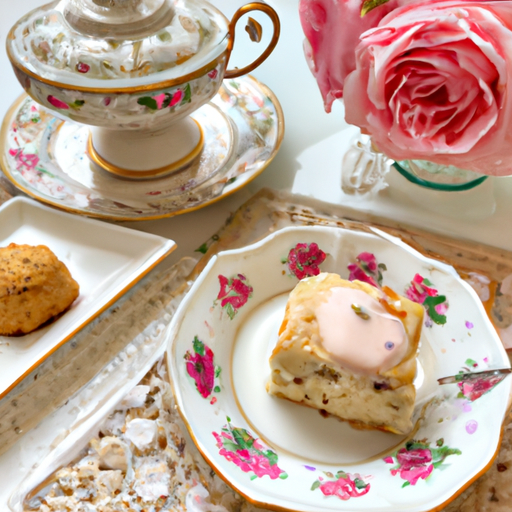
 Tea Brewing and Preparation2 weeks ago
Tea Brewing and Preparation2 weeks agoAfternoon Tea Etiquette: 12 Dos And Don’Ts
-
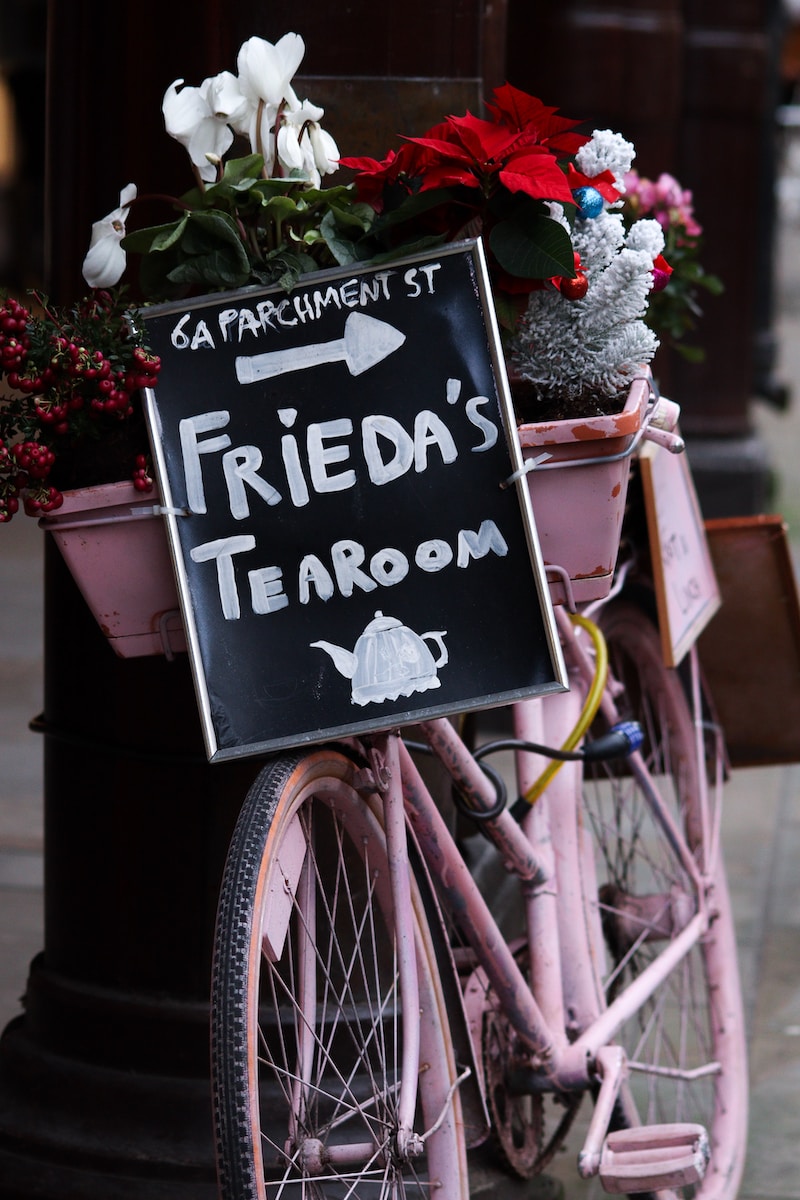
 Tea Industry Trends and Innovations2 days ago
Tea Industry Trends and Innovations2 days agoCritical Thinking Is Important For Evaluating Which Parts Of Advertisement
-
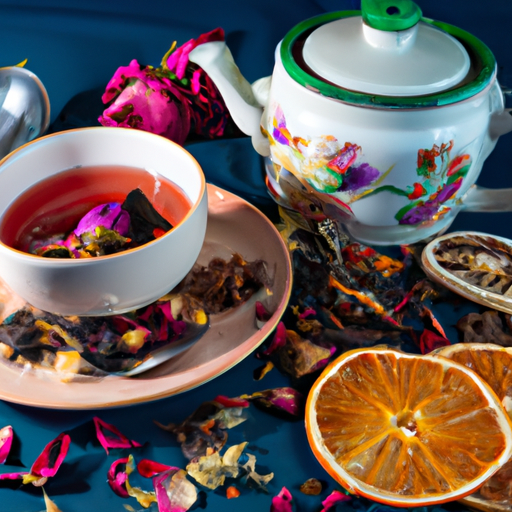
 Tea Brewing and Preparation2 weeks ago
Tea Brewing and Preparation2 weeks agoExploring English Breakfast Tea: Flavors, Blends, And Recommendations
-

 Tea Brewing and Preparation1 week ago
Tea Brewing and Preparation1 week agoStarting A Profitable Tea Business: Tips, Resources, And Success Stories
-

 Tea Brewing and Preparation2 weeks ago
Tea Brewing and Preparation2 weeks agoHow To Cold Steep Tea (And Why!)
-

 Herbal Tea3 weeks ago
Herbal Tea3 weeks agoWhat Herbal Tea Can Help With Lower Back Pain
-
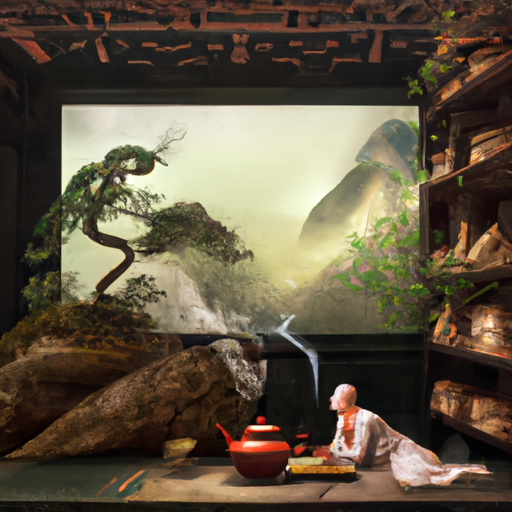
 Tea Brewing and Preparation1 week ago
Tea Brewing and Preparation1 week agoThe Profound Wisdom Of Tea: Inspiring Quotes To Enhance Your Life




